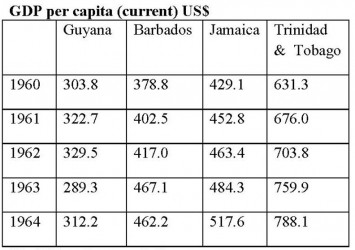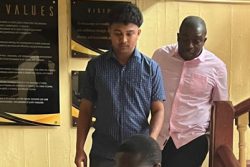If the APNU/AFC coalition can seek succour in the failed Jagan/Burnham attempt to form a national movement, it would well be reminded that it also has much in common with the 1950s alliance between Forbes Burnham and Dr. J. P Lachmansingh, which sought to wrench the Jaganite/PPP from office but was a spectacular failure. This latter alliance rested upon a similar belief about the place of race in Guyanese politics; had similar aspirations for bringing the races together; had a different ideological orientation but foundered on the same issue that threatens the electoral success of the present effort: apan jhaat politics.
 I have argued many a time in this column and elsewhere that over its long history the PPP has been quite successful in embedding numerous myths in the minds of even those Guyanese who are opposed to it. Its account of the Burnham/Lachmansingh alliance is one such myth but take two other topical examples: the PPP’s record on development and debt.
I have argued many a time in this column and elsewhere that over its long history the PPP has been quite successful in embedding numerous myths in the minds of even those Guyanese who are opposed to it. Its account of the Burnham/Lachmansingh alliance is one such myth but take two other topical examples: the PPP’s record on development and debt.
World Development Indicators
Given the above figures, what are we to make of the still persistent claims that Guyana developed so rapidly during the first PPP regime that it became a leader among the leading countries of the Commonwealth Caribbean? The PPP/Jaganite came to government in 1957 but the World Development Indicators began in 1960 and what it indicates is that at best Guyana stagnated, while the other larger countries of the Caribbean Commonwealth with which Guyana liked to be associated, were moving ahead.
Coming up to the 2011 elections I contended that an unbiased person will find it difficult to attack the record of former finance minister Mr. Carl Greenidge for, among other things, “the economic recovery programme negotiated by Greenidge left us with a comparative growth trajectory that has not been seen in recent times” (“The best PNCR presidential hopeful is Carl Greenidge”, SN: 09/02/2011). Average annual GDP growth was about 7% between 1991, when the ERP first kicked in, and 1997. These results meant that around 1998 Guyana was designated a lower middle income country.
However, the decades-long success of its approach has steeled the PPP in the, not unreasonable, belief that in the minds of men propaganda can change reality and it has been making just such an attempt with Mr. Greenidge.
Secondly, while it cannot be denied that for various reasons Guyana’s debt became unsustainable under the PNC, the PPP speaks as if the Burnham regime invented the national debt and that its record is pristine.
I argued some time ago that in his budget presentation on the PNC/UF coalition coming to office in 1964, finance minister Peter D’Aguiar claimed that the “Public Debt at 31st December 1964 was $134 millions of which $29 millions were internal and $105 millions were external” (“The public debt began its rise in the colonial era and became unsustainable in the Burnham era”, SN: 27/05/2009).
Poking his nose at the PPP, he noted that that Guyana had a per capita income of US$290 but a per capita debt of $211. He compared this with Trinidad & Tobago’s per capita income of US$740 but per capita debt of $228. He then reminded that “Ten years ago [Guyana’s] per capita debt was $74”!
Here again, the PPP wishes to discredit Greenidge and accumulate all the credit for the reduction of the national debt. However, as I pointed out in the article above “It was Greenidge’s ERP which committed the international community to provide debt relief to Guyana and began the struggle for debt relief.”
The 1988 ERP recognized that “Guyana’s continued development also depends heavily on continued access to concessionary external finance, as well as concessionary debt relief.” And the 1992 World Bank report (“From Economic Recovery to Sustained Growth”) noted that “Dealing with the problem of the debt has occupied a major segment of the (PNC) Government’s attention…. Guyana has received two reschedulings from the Paris Club, the latest in September 1990 on Toronto terms.”
Those aside, we have to overcome an even larger PPP myth if we are to properly appreciate the importance and orientation of the largely forgotten Burnham/Lachmansingh alliance.
The PPP has made many of us believe that by successfully standing against it in the 1950s/60s the opposition destroyed the nationalist movement for change and development! From a pure propaganda standpoint, the PPP was successful in ideologically collapsing and equating the struggle for Guyana’s independence with opposition to it as a political party. That is, it was largely able to sell the notion that to be against what was perceived as a communist-orientated PPP was to be against the nation!
Of course, nothing was further from the truth. The people who were fighting the Jagans wanted a non-communist nationalist movement such as the type then existing in most of the British West Indies. Their plan was to create a moderate national alliance and with Forbes Burnham as leader and Dr. Lachmansingh as his deputy they, wrongly, thought that – as we will say today – they had it locked.
Jagan summed up well the goal and strategy of the opposition forces when in his “The West on Trial” he related RBO Hart’s pleading with Burnham from his 1954 article in the Guiana Graphic.
“You owe a duty to the people of this country who have followed you blindly. … You have done nothing to merit their blind support and idolatry. How can you as a young man of any character and decency lead them astray again? You and Dr. J. P Lachmansingh would make a very effective team, and if you stood hand in hand would be able to keep the party together while kicking the extremists out. Lachmansingh is no spring chicken himself, but he is one of the few men in your party of whom I would say, ‘he is not a Communist.”
Elections are very volatile things and notwithstanding the near cocksure posture of Hart and his colleagues, the Burnham/Lachmansingh alliance went down to a spectacular defeat at the 1957 elections, winning only three of the fourteen available seats. They claimed that their loss resulted largely from the PPP resort to apan jhaat politics and this we will next consider.
henryjeffrey@yahoo.com










